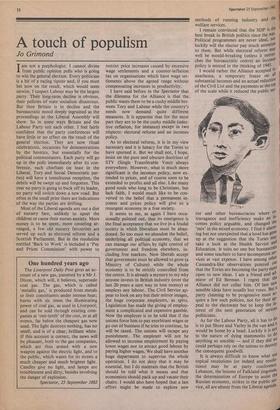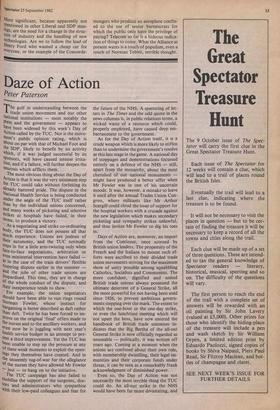A touch of populism
Jo Grimond
T am not a psephologist. I cannot divine 1 from public opinion polls who is going to win the general election. Every politician is a bit of a racing tipster and, if you must bet now on the result, which would seem unwise, I suspect Labour may be the largest party. Their long-term, decline is obvious, their policies of state socialism disastrous. But then Britain is in decline and the bureaucratic mood deeply ingrained as the proceedings at the Liberal Assembly will show. So in some ways Britain and the Labour Party suit each other. I feel fairly confident that the party conferences will have little or no effect on the result of the general election. They are now ritual celebrations, occasions for demonstrations by the heretics, but essentially for the political commentators. Each party will go up in the polls immediately after its con- ference, each chieftain (at least in the Liberal, Tory and Social Democratic par- ties) will have a tumultuous reception, the debris will be swept up and forgotten. This year no party is going to buck off its leader, no party will switch down a new road. But often in the small print there are indications of the way the parties are drifting.
Most of the Liberal agenda sets out a diet of nursery fare, unlikely to upset the children or cause their nurses anxiety. More money is to be spent, more cosseting ar- ranged, a few old nursery favourites are served up such as electoral reform and a Scottish Parliament. But in the resolution entitled 'Back to Work' is included a 'Pay and Prices Commission' with power to restrict price increases caused by excessive wage settlements and a counter-inflation tax on organisations which have wage set- tlements above the agreed range without compensating increases in productivity.
I have said before in the Spectator that the dilemma for the Alliance is that the. public wants them to be a cushy middle bet- ween Tory and Labour while the country's needs now demand quite different measures. It is apparent that for the most part they are to be the cushy middle (selec- tive reflation, for instance) except in two respects: electoral reform and an incomes policy.
As to electoral reform, it is in my view necessary and it is lunacy for the Tories to have spurned it. But we shall not, I hope, insist on the pure and obscure doctrines of STV (Single Transferable Vote) always everywhere. However, what is much more significant is the incomes policy, now ex- tended to prices, and of course soon to be extended to profits and all else. Like many good souls who long ,to be Christians, but lack faith, I would much like to be con- verted to the belief that a permanent in- comes and prices policy will give us a resurgent economy in a free society.
It seems to me, as again I have occa- sionally pointed out, that its emergence is the final acceptance that we live in a feudal society in which liberalism must be aban- doned. So too must we abandon the belief, underlying all political economy, that we can manage our affairs by tight control of government and freedom elsewhere, in- cluding free markets. Now liberals accept that government must be allowed to grow (a Ministry of Culture) while the whole economy is to be strictly controlled from the centre. It is already a mystery to my why anyone invests in British industry (over the last 20 years a sure way to lose money) or employs any labour. The Civil Service ap- pear to look on any but their mirror images, the huge corporate employers, as spivs. Legislation has made the giving of employ- ment a complicated and expensive gamble. Now the employer is to be told that if the unions force him to pay exorbitant wages or go out of business if he tries to continue, he will be taxed. The unions will escape any punishment. The employer will not be allowed to increase employment by paying lower wages nor to attract good labour by paying higher wages. We shall have another huge department to supervise the whole operation. I do not deny that it may be essential, but I do maintain that the British should be told what it means and that economists should pack up and vacate their chairs. I would also have hoped that a last effort might be made to explore new methods of running industry and the welfare services.
I remain convinced that the SDP is the best break in British politics since the war. Political programmes are never ideal, nor luckily will the elector pay much attention to them. But while electoral reform mg well be mould-breaking (unless it entren- ches the bureaucratic centre) an incomes policy is minted in the thinking of 1945.. I would rather the Alliance accepted its anathema, a temporary freeze on 211 substantial incomes and an actual reduction of the Civil List and the payments at the top of the scale while it reduced the public see' tor and other bureaucracies where ex" travagance and inefficiency make an 10. comes policy arguable, and changed the `mix' in the mixed economy. I find it alarm" ing but not unexpected that a howl has gone up at the suggestion that the Tories Ina,Y take a look at the Health Service and Education. It suits no one but bureaucrats and some teachers to have incompetent sec' vices at vast expense. I have among other Cassandra-like observations pointed 0(1t that the Tories are becoming the party 111°s: open to new ideas. I am a friend and ad- mirer of Ed Berman. I regret that the Alliance did not collar him. Of late new' sensible ideas have usually lost votes. But a party claiming to be progressive must ac" quire a few such policies, not for their ar peal to the electorate but to keep the In' terest of the next generation of serious politicians. As for the Labour Party, all it has to d° is to put Shore and Varley in the van and it would be home by a head. Luckily it is Ot in the nature of dying mammoths to d° anything so sensible — and if they did We could perhaps rely on the unions to destroY the consequent goodwill. It is always difficult to know what use topical resolutions (or indeed any resole' tions) may be at party conference. Lebanon, the lessons of Falkland jingoism, the determination of Europe to assist the Russian economy, strikes in the public ser- vice, all are absent from the Liberal agenda' More significant, because apparently not Mentioned in other Liberal and SDP mus- ings, are the need for a change in the struc- ture of industry and the handling of new technologies. Are we to follow the lead of Henry Ford who wanted a cheap car for everyone, or the example of the Concorde-
mongers who produce an aeroplane confin- ed to the use of senior bureaucrats for which the public only have the privilege of paying? Telecom so far is a hideous indica- tion of things to come. What the Alliance at present wants is a touch of populism, even a touch of Norman Tebbit, terrible thought.



































 Previous page
Previous page